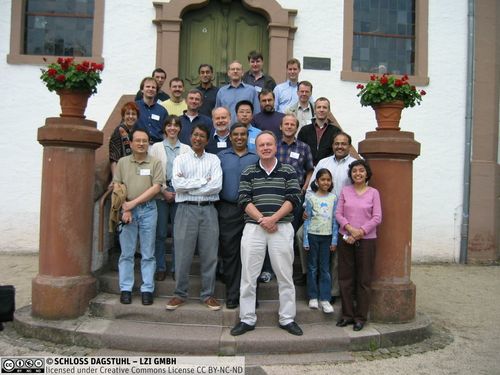Dagstuhl Perspectives Workshop 04292
Perspectives Workshop: Data Mining: The Next Generation
( Jul 11 – Jul 16, 2004 )
Permalink
Organizers
- Rakesh Agrawal (Microsoft Corp. - Mountain View, US)
- Johann-Christoph Freytag (HU Berlin, DE)
- Raghu Ramakrishnan (Yahoo! Research - Santa Clara, US)
Contact
Data Mining has enjoyed great popularity in recent years, with advances in both research and commercialization. The first generation of data mining research and development has yielded several commercially available systems, both stand-alone and integrated with database systems; produced scalable versions of algorithms for many classical data mining problems; and introduced novel pattern discovery problems.
In recent years, research has tended to be fragmented into several distinct pockets without a comprehensive framework. Researchers have continued to work largely within the parameters of their parent disciplines, building upon existing and distinct research methodologies. Even when they address a common problem (for example, how to cluster a dataset) they apply different techniques, different perspectives on what the important issues are, and different evaluation criteria. While different approaches can be complementary, and such a diversity is ultimately a strength of the field, better communication across disciplines is required if Data Mining is to forge a distinct identity with a core set of principles, perspectives, and challenges that differentiate it from each of the parent disciplines. Further, while the amount and complexity of data continues to grow rapidly, and the task of distilling useful insight continues to be central, serious concerns have emerged about social implications of data mining. Addressing these concerns will require advances in our theoretical understanding of the principles that underlie Data Mining algorithms, as well as an integrated approach to security and privacy in all phases of data management and analysis.
Researchers from a variety of backgrounds assembled at Dagstuhl to re-assess the current directions of the field, to identify critical problems that require attention, and to discuss ways to increase the flow of ideas across the different disciplines that Data Mining has brought together. The workshop did not seek to draw up an agenda for the field of data mining. Rather, it offers the participants’ perspective on two technical directions - compositionality and privacy - and describes some important application challenges that drove the discussion. Both of these directions illustrate the opportunities for cross-disciplinary research, and there was broad agreement that they represent important and timely areas for further work; of course, the choice of these directions as topics for discussion also reflects the personal interests and biases of the workshop participants.
- Rakesh Agrawal (Microsoft Corp. - Mountain View, US)
- Toni Bollinger (IBM Deutschland - Böblingen, DE)
- Christopher W. Clifton (Purdue University - West Lafayette, US)
- Saso Dzeroski (Jozef Stefan Institute - Ljubljana, SI) [dblp]
- Johann-Christoph Freytag (HU Berlin, DE) [dblp]
- Johannes Gehrke (Cornell University, US) [dblp]
- Jochen Hipp (Daimler R&D - Ulm, DE)
- Daniel A. Keim (Universität Konstanz, DE) [dblp]
- Stefan Kramer (TU München, DE) [dblp]
- Hans-Peter Kriegel (LMU München, DE)
- Ulf Leser (HU Berlin, DE) [dblp]
- Bing Liu (University of Illinois - Chicago, US) [dblp]
- Heikki Mannila (University of Helsinki, FI) [dblp]
- Rosa Meo (University of Turin, IT)
- Shinichi Morishita (University of Tokyo, JP)
- Raymond T. Ng (University of British Columbia - Vancouver, CA)
- Jian Pei (Simon Fraser University - Burnaby, CA) [dblp]
- Prabhakar Raghavan (Yahoo! Research - Santa Clara, US)
- Raghu Ramakrishnan (Yahoo! Research - Santa Clara, US) [dblp]
- Myra Spiliopoulou (Universität Magdeburg, DE) [dblp]
- Jaideep Srivastava (University of Minnesota - Minneapolis, US)
- Vicenc Torra (Autonomus University of Barcelona, ES)
- Alexander Tuzhilin (New York University, US) [dblp]


